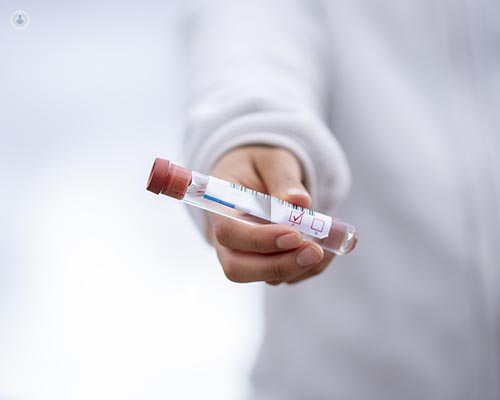Faecal occult blood (FOB)
What is being analysed?
Faecal occult blood (FOB) analysis is a diagnostic procedure that aims to detect the presence of blood in stool samples. The term "occult" refers to blood that is not visible to the naked eye, making this test crucial for identifying potential gastrointestinal bleeding that may not be apparent through visual inspection alone.

What does the result mean?
A positive result indicates the presence of blood in the stool, which may suggest bleeding in the digestive tract. It is essential to note that a positive result does not pinpoint the exact location or cause of bleeding but signals the need for further investigation.
Why do the analysis?
FOB analysis is a valuable tool for screening and diagnosing various gastrointestinal conditions, including colorectal cancer, polyps, ulcers, and other sources of bleeding. Early detection through FOB testing can facilitate timely intervention and improve patient outcomes.
When to do the analysis?
Healthcare providers may recommend FOB analysis as part of routine screenings, especially for individuals at higher risk of gastrointestinal issues or those with a family history of colorectal cancer. Additionally, it is ordered when patients exhibit symptoms such as unexplained anaemia, abdominal pain, or changes in bowel habits.
What sample is required?
The FOB test requires a small sample of stool. Patients are typically provided with a collection kit and detailed instructions on how to obtain a representative sample.
Is any type of prior preparation necessary?
To ensure accurate results, certain dietary restrictions may be advised before the test. Patients may be asked to avoid specific foods, medications, and supplements that could interfere with the analysis.
How is it used?
FOB analysis is a non-invasive and cost-effective method to screen for gastrointestinal bleeding. A positive result prompts further diagnostic procedures, such as colonoscopy or imaging studies, to identify the source and extent of bleeding.
What are the normal values?
Normal values for FOB analysis are typically reported as negative, indicating the absence of detectable blood in the stool. However, it's important to interpret results in conjunction with clinical findings and the individual's medical history.
What does it mean to have altered values?
Altered values, or a positive result, may suggest various conditions such as colorectal cancer, inflammatory bowel disease, diverticulitis, or gastrointestinal bleeding. However, false positives can occur, emphasising the importance of follow-up testing to confirm the findings.
Values in Table Format
|
Result |
Interpretation |
|
Negative |
No detectable blood in the stool |
|
Positive |
Presence of occult blood, further investigation needed |
|
Inconclusive |
Results may need confirmation through additional testing |
Remember, the interpretation of FOB analysis results should be done by a qualified healthcare professional in the context of the patient's overall health and medical history. If you have concerns or questions about FOB testing, consult with your doctor for personalised guidance.